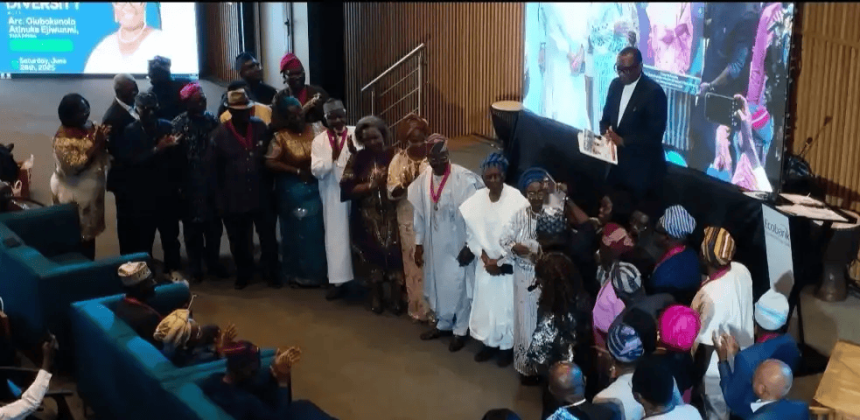Former President of the Nigerian Institute of Architects (NIA), Arc. (Mrs.) Olubukunola Atinuke Ejiwunmi, delivered an inspiring keynote address on Saturday at the 6th NIA Distinguished Lecture in Lagos, calling on Nigerians to transform the nation’s rich diversity into a unifying force for national growth.
The prestigious event attracted an array of eminent personalities, including the Oniru of Iruland, Oba Abdulwasiu Omogbolahan Lawal; Lagos State Deputy Governor Dr. Kadri Obafemi Hamzat, who represented Governor Babajide Sanwo-Olu; and the Managing Director of Ecobank Nigeria, Mr. Bolaji Lawal.
Welcoming attendees, NIA President Arc. Mobolaji Adeniyi, FNIA, paid tribute to Arc. Ejiwunmi’s enduring legacy. “Her tenure from 2001 to 2003 was marked by visionary leadership and mentorship, as she engaged architecture schools nationwide and guided young professionals,” Adeniyi said. He also highlighted her contributions as a former Permanent Secretary in Lagos State, noting that her public service continues to inspire the Institute.
In his goodwill message, Oba Lawal offered personal reflections on diversity drawn from his university years in Port Harcourt. “We learned to accept and support each other despite our differences,” he shared. The monarch emphasized that Nigeria’s pluralism should be celebrated as a foundation for inclusive development.
He also announced his forthcoming memoir, From City to Mega-City: A Memoir of Lagos of Connection 1999–2023 and praised the NIA lecture series for fostering intergenerational mentorship within the profession.
Speaking on the theme “Harmony in Diversity,” Arc. Ejiwunmi described architects as conductors orchestrating diverse elements into cohesive designs. “True harmony is not about eliminating differences but weaving them together into a stronger whole,” she said.
Drawing from her personal and professional journey, she illustrated diversity across several spheres:
•Family: Emphasizing respect and understanding in polygamous settings.
•Religion: Advocating interfaith coexistence, especially prominent in Southwestern Nigeria.
•Society: Highlighting cultural festivals like Ojude Oba and Eyo as symbols of unity.
•Politics: Calling for civility and prioritizing national interests.
•Government: Sharing lessons from her tenure as Permanent Secretary in multiple ministries.
•Architecture: Urging the design of buildings that reflect Nigeria’s regional identities, climate realities, and cultural richness.
She also encouraged the NIA to strengthen collaborations with regulatory bodies, expand mentorship, and advocate for local content in projects. “Unity does not erase our differences; it celebrates and amplifies them,” she declared.
In a strong endorsement of the profession, Ecobank Nigeria MD Mr. Bolaji Lawal unveiled a strategic partnership with the NIA to launch four national architecture competitions:
1.Undergraduate Team Design Challenge
2.Young Female Architects Eco-Resort Design Competition
3.Affordable Housing Using Local Materials
4.Comprehensive Healthcare Centre Design
“Architecture plays a vital role in national development, and we are honored to support these transformative initiatives,” Lawal stated.
Arc. Adeniyi expressed gratitude to Ecobank, revealing that a formal Memorandum of Understanding had been signed. He emphasized that these competitions would nurture emerging talents and stimulate innovative solutions.
As part of the collaboration, a new Ecobank-NIA “Master Speak” lecture series was announced to further promote professional development.
Arc. Ejiwunmi concluded by challenging architects to integrate technology, sustainability, and cultural authenticity into their work. “Architecture must embody our collective identity: diverse, resilient, and united,” she said.
With voices from traditional institutions, public service, and the private sector resonating in unison, the 6th NIA Distinguished Lecture underscored architecture’s critical role in shaping not just physical spaces, but the very fabric of Nigerian society.




